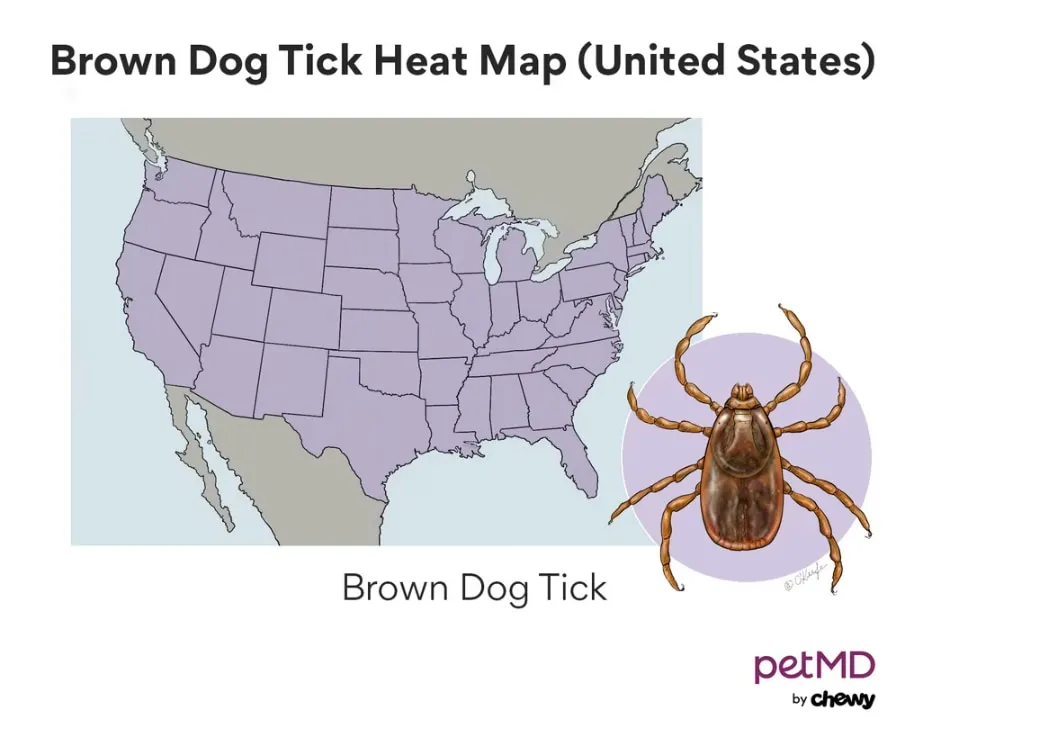Ensuring your dog’s health and happiness includes proactive preventative care, and one of the most effective strategies for warding off potential health complications is consistent use of monthly flea and tick preventatives. While many effective treatments require a veterinarian’s prescription, a variety of reliable over-the-counter (OTC) flea meds for dogs are available, providing convenient options for pet parents. This guide will explore the importance of flea and tick prevention, key considerations when choosing a product, and detail popular OTC solutions to help keep your canine companion protected year-round.
Understanding Fleas and Ticks: Why Prevention is Crucial for Your Dog
Fleas and ticks are external parasites, meaning they reside on the surface of their host and require blood meals to survive. Their bites can significantly compromise your dog’s well-being, leading to various health issues, some of which can be severe.
The Dangers of Flea Bites
The saliva from a flea bite can trigger intense allergic reactions, manifesting as severe itching, dermatitis (skin inflammation), and secondary skin infections from scratching. In puppies or smaller dogs with heavy infestations, significant blood loss from fleas can even lead to anemia, a potentially life-threatening condition.
The Risks of Tick Bites
Tick bites carry even more serious risks. Beyond local infections and abscesses at the bite site, certain ticks can transmit dangerous diseases. These can include conditions like Lyme disease, Anaplasmosis, Ehrlichiosis, Rocky Mountain Spotted Fever, and Babesiosis, which can cause lameness, lethargy, fever, joint pain, and other debilitating symptoms. In rare cases, tick paralysis can occur, and severe infestations or complications can even be fatal.
Zoonotic Potential: How Fleas and Ticks Affect Humans
A critical reason for diligent prevention is the zoonotic potential of these parasites. Some diseases carried by fleas and ticks can spread from dogs to humans. For instance, certain types of ticks can transmit Lyme disease or Rocky Mountain Spotted Fever to people, while fleas can transmit Bartonellosis (cat scratch fever) or tapeworms. Therefore, keeping your dog free of these pests not only protects your pet but also safeguards your entire household.
When Your Dog Needs Flea and Tick Prevention
Fleas and ticks are resilient and can thrive in diverse geographical regions and climates. Given their ability to transmit diseases that endanger both pets and people, it’s imperative to initiate flea and tick prevention for your dog as early as 8 weeks of age and continue treatment year-round throughout their entire life. Many pet parents mistakenly believe that prevention is only necessary during warmer months or if their dog spends significant time outdoors. However, fleas can survive indoors year-round, and ticks can be active even in mild winter temperatures. Consistent, year-round prevention offers the best defense.
Choosing the Right Flea and Tick Treatment: Beyond Over-the-Counter Options
The market offers a wide array of products designed to protect your dog from parasites. These treatments work in various ways, acting as pesticides to kill parasites, repellents to deter them, or growth inhibitors to disrupt their life cycle and prevent infestations.
Some products target only one type of parasite, typically fleas. However, combination flea and tick preventatives for dogs are often recommended as they contain multiple active ingredients to combat different pests simultaneously. These comprehensive options can also offer protection against other internal parasites such as heartworms, roundworms, and hookworms, as well as external parasites like skin and ear mites. For example, products like Credelio Quattro offer broad-spectrum protection against fleas, ticks, heartworms, roundworms, hookworms, and tapeworms, demonstrating the comprehensive nature of advanced preventative medicines.
Before making any decision, especially when considering over-the-counter flea meds for dogs, always consult your veterinarian. They can help you select a product that is the best and safest fit for your dog’s specific needs. When reviewing product labels and discussing options with your vet, ensure you cover the following key points:
- Species Appropriateness: Verify the product is specifically formulated for dogs, not cats, as some ingredients toxic to cats may be present.
- Correct Weight Range: Confirm the dosage is suitable for your dog’s current weight to ensure efficacy and prevent adverse reactions.
- Targeted Parasites: Ensure the product protects against the specific fleas and ticks prevalent in your area, and any other parasites your dog may be at risk for (e.g., heartworms, intestinal worms).
- Administration Guidelines: Understand whether the product should be given with food, and follow instructions precisely.
- Frequency of Administration: Know how often to administer the product (e.g., monthly, every three months, or as a collar for several months).
- Onset of Action: Be aware of how long it takes for the product to start working effectively after application.
- Post-Application Care: Know how soon you can bathe your pet after applying topical treatments without reducing efficacy.
- Safety Concerns: Inquire about any known side effects or safety precautions associated with the product.
- Adverse Reaction Protocol: Understand what steps to take in the unlikely event of an adverse reaction to the medication.
Key Factors to Consider When Selecting Flea Prevention for Your Dog
Beyond the basic requirements, several other factors should influence your choice of flea and tick prevention, whether it’s an over-the-counter flea med for dogs or a prescription option.
Application Method
Flea and tick preventatives are most commonly available in two primary forms:
- Oral: These are chewable tablets that your dog ingests, often formulated to be palatable like a treat.
- Topical: These are liquid solutions applied directly to your dog’s skin, typically between the shoulder blades or down the back.
Topical preventatives can be an excellent choice for dogs who are finicky eaters or have sensitive digestive systems, as they bypass the gastrointestinal tract. However, if you have young children or other pets in the household, care must be taken to prevent them from touching or licking the application site before the product has fully dried. Topical treatments may also be less ideal for dogs who frequently swim or require regular baths, as water exposure can potentially diminish the product’s effectiveness.
Oral treatments offer convenience for many dog parents, as they can be easily administered like a treat. It’s important to monitor your dog after administration to ensure they have consumed the entire tablet and have not vomited it before it can be absorbed into their system.
Geographical Location and Local Parasite Populations
The prevalence and types of fleas and ticks can vary significantly by geographical region. Different areas have distinct local parasite populations, each posing unique threats. Resources like the Companion Animal Parasite Council (CAPCvet.org) provide valuable localized data, allowing you to identify the specific parasites common in your region. This information is crucial for ensuring that the over-the-counter flea meds for dogs or prescription products you choose offer comprehensive protection against the most relevant threats in your area.
 American dog tick on leaf
American dog tick on leaf
 Brown dog tick on a blade of grass
Brown dog tick on a blade of grass
 Deer tick on a leaf
Deer tick on a leaf
 Lone Star tick on a plant stem
Lone Star tick on a plant stem
Access to the Outdoors
Consider the environments where your dog spends time. Dog parks, hiking trails, wooded areas, public parks, dense bushes, and even your own backyard can all harbor fleas and ticks. Dogs that spend significant time in heavily wooded areas or places frequented by other animals and dogs face a substantially higher risk of parasite exposure.
However, even if your dog rarely ventures outdoors, prevention is still essential. Fleas can easily infiltrate your home through window screens, hitch a ride on other pets that go outside, or even be carried in on your clothing and shoes. For this reason, veterinarians consistently recommend year-round flea and tick prevention for all dogs, regardless of their outdoor activity level.
MDR-1 Gene and Breed-Specific Sensitivities
Certain dog breeds, such as Collies, Australian Shepherds, and Shetland Sheepdogs, may possess a genetic mutation known as MDR-1. This mutation can impair their ability to properly metabolize and break down certain medications, making them more susceptible to adverse reactions. Many veterinarians suggest testing dogs from affected breeds for the MDR-1 gene. While many manufacturers of parasite preventatives have rigorously tested their products for safety in dogs with the MDR-1 mutation and found no adverse effects, it’s always prudent to discuss this with your veterinarian, especially if your dog is an affected breed or has an unknown genetic background.
Lifestyle and Activity Level
While no specific breed is inherently more prone to acquiring fleas or ticks, a dog’s individual personality and lifestyle can influence their risk. Working, herding, or hunting dogs that spend the majority of their day outdoors in fields or forests may have a higher likelihood of exposure compared to dogs who prefer a more sedentary indoor life, only venturing out for short walks. Tailoring your prevention strategy to your dog’s typical activities is important.
Life Stage: Puppies and Small Breeds
The age and size of your dog are crucial factors in determining an appropriate flea and tick product. Puppies and small dog breeds require careful consideration. Most flea and tick preventatives have a minimum age requirement, typically 8 weeks, and a minimum weight threshold. Always meticulously check the package insert for specific age and weight guidelines. Some specialized products, such as Revolution Topical Solution for Kittens and Puppies, are formulated for very young animals and can be used as early as 6 weeks of age, but these are generally prescription-only. For over-the-counter flea meds for dogs, confirm they are suitable for your puppy’s age and weight.
Pre-existing Medical Conditions
It is vital to have a thorough discussion with your veterinarian about your dog’s health history before starting any flea and tick preventative. Certain classes of preventatives, particularly isoxazolines, should be administered with extreme caution in dogs with a history of seizures or other neurological conditions. These medications may potentially lower the seizure threshold in susceptible dogs.
Furthermore, no preventative medication should be used without a comprehensive discussion with your veterinarian if:
- Your dog has previously experienced an allergic reaction to any medication.
- Your dog is currently sick or underweight, as their system may be compromised.
- Your dog is pregnant, nursing, or is intended for future breeding, as medication safety for these sensitive stages needs specific veterinary guidance.
Over-the-Counter vs. Prescription Flea and Tick Medications
The landscape of flea and tick preventatives includes both medications that require a veterinary prescription and those available over-the-counter (OTC). Understanding the distinction is crucial for making informed decisions.
Understanding Over-the-Counter (OTC) Flea Meds for Dogs
Over-the-counter flea and tick preventatives do not necessitate a prescription from a veterinarian. These products are readily available for purchase online, at general retail stores, and in many pet supply stores. They offer convenience and are often a more budget-friendly option. Common examples of effective over-the-counter flea meds for dogs include certain topical treatments and collars that have been proven to kill and repel fleas and ticks.
If you choose to use an OTC flea and tick preventative, it is still strongly recommended that you consult with your veterinarian first. Your vet can confirm that the product is a safe and appropriate choice for your dog, considering their age, weight, health status, and local parasite risks. They can also advise on proper application and potential interactions.
The Benefits of Prescription Flea and Tick Products
Prescription flea and tick preventatives, by definition, require a valid prescription from your veterinarian. While they may sometimes carry a higher price point than OTC options, many veterinarians advocate for prescription products due to their often superior efficacy and safety profiles. Prescription medications frequently contain newer active ingredients or unique formulations that may offer broader spectrum protection, faster action, or a more sustained effect. They are typically subjected to more rigorous testing and oversight, ensuring their reliability. Your veterinarian’s ability to prescribe these medications ensures that your dog receives the most appropriate and powerful protection tailored to their specific health needs.
Exploring Popular Flea and Tick Prevention Products for Dogs (Including Over-the-Counter Options)
This section details several popular flea and tick prevention products. It’s important to note that while some are widely available over-the-counter, others require a prescription. Always confirm with your veterinarian which option is best for your dog.
Advantage
Advantage II is a topical monthly product that is generally available over-the-counter. It contains imidacloprid and pyriproxyfen, a combination that acts quickly to kill all forms of fleas—including eggs, larvae, and adults—within hours, as well as chewing lice. However, this particular formulation does not offer tick prevention. Advantage II is suitable for dogs and puppies over 7 weeks of age and weighing more than 3 pounds.
Advantage Multi is a topical monthly product, typically available by prescription, containing imidacloprid and moxidectin. This combination treats fleas, sarcoptic mange, intestinal parasites (hookworms, roundworms, and whipworms), and prevents heartworm disease. It kills fleas within hours, with other parasites taking up to 24 hours. This product does not provide tick prevention. Advantage Multi is approved for dogs and puppies over 7 weeks and weighing more than 3 pounds.
Bravecto
Bravecto is available as a chewable tablet or topical solution and is a prescription-only medication. It contains fluralaner, an active ingredient belonging to the isoxazoline drug class. Bravecto is fast-acting, starting to kill fleas within two hours and ticks within 12 hours, with protection lasting for up to 12 weeks. It is also effective against demodectic, sarcoptic mange, and ear mites. Due to its isoxazoline nature, all Bravecto products should be used cautiously in dogs with a history of seizures, epilepsy, or other neurological disorders.
Comfortis
Comfortis is a chewable tablet that is typically a prescription-only medication. It contains spinosad, an active ingredient that specifically targets and kills fleas. Comfortis is a very fast-acting agent, eliminating fleas within 30 minutes of dosing. It is approved for dogs and puppies 14 weeks or older and weighing over 5 pounds, administered monthly.
Credelio
Credelio is a chewable tablet available by prescription. It contains lotilaner, another active ingredient from the isoxazoline drug class, effective against fleas and ticks. Credelio acts rapidly, starting to kill fleas within four hours of administration, and is administered monthly. This product is for dogs and puppies over 8 weeks of age and weighing more than 4.4 pounds. Similar to other isoxazolines, Credelio should be used with caution in dogs with a history of seizures, epilepsy, or neurological disorders.
Credelio Quattro
Similar to Credelio, Credelio Quattro is a chewable tablet available by prescription, offering an even broader spectrum of protection. It contains lotilaner for fleas and ticks, moxidectin for heartworms, hookworms, and roundworms, praziquantel for two species of tapeworms, and pyrantel for hookworms and roundworms. Administered monthly, Credelio Quattro is suitable for dogs and puppies 8 weeks of age and older who weigh at least 3.3 pounds.
Frontline
Frontline Gold is a topical monthly product generally available over-the-counter. It contains fipronil, (s)-methoprene, and pyriproxyfen, a combination that kills fleas, ticks, and chewing lice rapidly within hours. This product is approved for dogs and puppies over 8 weeks of age and weighing more than 5 pounds.
Frontline Plus is another topical monthly product commonly found over-the-counter. Its active ingredients are fipronil and (s)-methoprene, which kill fleas, ticks, and chewing lice. While fast-acting, it may take slightly longer to reach full efficacy compared to Frontline Gold. It is approved for dogs and puppies over 8 weeks of age and weighing more than 5 pounds.
Frontline Shield is a topical monthly product typically available over-the-counter. It contains fipronil, permethrin, and pyriproxyfen, which kill all fleas, ticks, chewing lice, and stable flies. It also repels mosquitoes, stable flies, and ticks. Frontline Shield begins killing fleas in five minutes and ticks within one hour. It is for dogs and puppies over 9 weeks of age and weighing more than 5 pounds. A critical warning: This product is highly toxic to cats. Extreme caution or avoidance should be exercised in households with cats.
K9 Advantix
K9 Advantix II is a topical monthly product widely available over-the-counter. It contains imidacloprid, permethrin, and pyriproxyfen. This powerful combination repels and kills fleas, ticks, mosquitoes, and chewing lice, and also repels biting flies. K9 Advantix II is fast-acting, beginning to kill parasites within hours. It is approved for dogs and puppies over 7 weeks old and weighing more than 4 pounds. Important safety note: This product is also highly toxic to cats. Avoidance or extreme caution is essential in multi-pet households with cats.
Nexgard
Nexgard is a chewable tablet available by prescription. Its active ingredient is afoxolaner, an isoxazoline. Nexgard is effective against fleas, deer ticks, American dog ticks, brown dog ticks, and Lone Star ticks. It is also used off-label for the treatment of sarcoptic and demodectic mange. Nexgard starts to kill fleas within four hours and ticks within 48 hours. This monthly product is for dogs and puppies over 8 weeks old and weighing more than 4 pounds. As with other isoxazolines, caution is advised for dogs with a history of seizures, epilepsy, or neurological disorders.
Onguard Plus
Onguard Plus is a topical monthly product that can often be found over-the-counter. It contains fipronil and (s)-methoprene, which work to kill fleas, ticks, sarcoptic mange, and chewing lice. This product is suitable for dogs and puppies over 8 weeks old and weighing more than 5 pounds.
Seresto
The Seresto collar is a popular over-the-counter option for long-lasting protection. It contains imidacloprid and flumethrin, which are released slowly to kill and repel fleas and ticks for eight consecutive months. Fleas are killed within 24 hours of application, and ticks within 48 hours. If a dog is bathed or swims frequently (more than once per month), the collar’s efficacy may decrease, potentially requiring replacement as often as every five months. It is safe for dogs and puppies over 7 weeks of age.
Simparica Trio
Simparica Trio is a chewable tablet available by prescription. It offers comprehensive protection with sarolaner (an isoxazoline), moxidectin, and pyrantel. This product treats fleas, ticks, roundworms, and hookworms, and importantly, prevents heartworm disease. It is also used off-label to treat demodectic mange, sarcoptic mange, and ear mites. Simparica Trio begins killing fleas and ticks within 12 hours. It is approved for dogs and puppies over 8 weeks old and weighing more than 2.8 pounds. As an isoxazoline-class drug, Simparica Trio should be used cautiously in dogs with a history of seizures, epilepsy, or neurological disorders.
Trifexis
Trifexis is a chewable tablet available by prescription. It combines spinosad and milbemycin oxime to effectively treat fleas, hookworms, roundworms, and whipworms, while also preventing heartworm disease. This fast-acting drug starts to kill fleas within 30 minutes. However, Trifexis does not provide protection from ticks. It is suitable for dogs and puppies 8 weeks or older and weighing over 5 pounds.
Vectra 3D
Vectra 3D is a topical monthly product that is often available over-the-counter. It contains dinotefuran, permethrin, and pyriproxyfen, a combination that repels and kills fleas, ticks, mosquitoes, chewing lice, sand flies, biting flies, and some mites. Vectra 3D begins killing parasites within hours. It is approved for dogs and puppies over 8 weeks old and weighing more than 5 pounds, and is typically applied monthly. Critical safety warning: This product is highly toxic to cats. Households with cats should exercise extreme caution or consider alternative products.
Key Takeaways for Choosing Over-the-Counter Flea Meds for Dogs
Selecting the right flea and tick preventative, especially from the range of over-the-counter flea meds for dogs, is a significant responsibility for any pet parent. While OTC options provide accessibility and convenience, the overarching principle remains: always prioritize your dog’s health and safety.
Remember to:
- Consult Your Veterinarian: Even for OTC products, a vet consultation is invaluable. They can offer personalized advice based on your dog’s specific needs, health history, and local parasite risks.
- Read Labels Thoroughly: Pay close attention to active ingredients, age and weight restrictions, application instructions, and any warnings.
- Understand the Spectrum of Protection: Be aware of which parasites a specific product targets. Many OTC flea meds for dogs are excellent for fleas but may not cover ticks, heartworms, or intestinal parasites.
- Monitor for Adverse Reactions: No matter the product, always observe your dog for any unusual behavior or side effects after administration.
Year-round prevention is the cornerstone of effective parasite control. By staying informed, consulting your veterinarian, and carefully choosing the most suitable over-the-counter flea meds for dogs or prescription treatments, you can ensure your beloved companion remains protected, healthy, and happy.
References
- PetMD: Best Flea & Tick Medications for Dogs
- PetMD: Flea Bite Hypersensitivity (Dermatitis) in Dogs
- PetMD: Anemia in Dogs
- PetMD: Why is My Dog Itching So Much?
- PetMD: 6 Tick Diseases Dogs Can Get
- PetMD: Heartworm Disease in Dogs
- Chewy: Credelio Quattro
- PetMD: Dogs That Love to Swim
- PetMD: How to Choose a Flea and Tick Pill for Dogs
- PetMD: 8 Types of Ticks on Dogs
- Companion Animal Parasite Council (CAPC)
- PetMD: MDR1 Gene in Dogs
- PetMD: Collie Dog Breed
- PetMD: Australian Shepherd Dog Breed
- PetMD: Shetland Sheepdog Dog Breed
- PetMD: Best Hunting Dogs
- PetMD: Small Dog Breeds
- Chewy: Revolution Topical Solution for Kittens and Puppies
- PetMD: Seizures in Dogs
- PetMD: Dog Pregnancy, Birth, and Puppy Care: A Complete Guide
- Chewy: Advantage II
- PetMD: Understanding the Flea Life Cycle
- Chewy: Advantage Multi
- PetMD: Sarcoptic Mange (Scabies) in Dogs
- PetMD: Hookworms in Dogs
- PetMD: Roundworms in Dogs
- PetMD: Whipworms in Dogs
- Chewy: Bravecto
- PetMD: Epilepsy in Dogs
- Chewy: Comfortis
- Chewy: Credelio
- Chewy: Credelio Quattro Chewable Tablets
- PetMD: Praziquantel
- PetMD: Pyrantel Pamoate
- Chewy: Frontline Gold
- Chewy: Frontline Plus
- Chewy: Frontline Shield
- Chewy: K9 Advantix II
- PetMD: Black Fly Bite on Dogs
- Chewy: Nexgard
- PetMD: About the Wood Tick (American Dog Tick)
- PetMD: Lone Star Tick
- PetMD: Demodectic Mange in Dogs
- Chewy: Onguard Plus
- PetMD: Seresto (Flumethrin, Imidacloprid)
- Chewy: Simparica Trio
- Chewy: Trifexis
- Chewy: Vectra 3D
WRITTEN BY
Veterinarian
Dr. Lauren Jones graduated from the University of Pennsylvania School of Veterinary Medicine in 2010, after receiving her bachelor’s degree…
